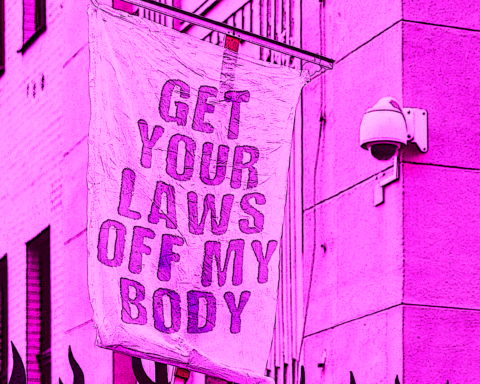
It is hard to remember back to the pre Roe v. Wade days. There were the road trips from Idaho to California with classmates seeking abortions. There were fledgling birth control devices and pills that made some aspects of decision-making easier and others ever more difficult. Somewhere in the 80s and 90s, we had a sexual revolution, but there was also an AIDS epidemic. There was an enormous backlash against women as moral decision makers, and new tests were invented that could peer into any stage of a pregnancy and predict an outcome.
Even though abortion is legal today in all 50 states, access to a safe and legal procedure has eroded since the passage of Roe v Wade. State legislatures have passed laws to create abortion restrictions and regulations such as expensive waiting periods, unnecessary tests, blurry ultrasound pictures, and wider clinic hallways, which have all become part of the process for many women. The availability of sex education is up, but unplanned pregnancies are still far too prevalent.
___________________________________________
As an All-Options counselor, I have spent over 30 years walking alongside girls and women facing difficult and often life-changing decisions related to pregnancy.
___________________________________________
There was also the pre-Roe legacy of the Clergy Consultation Service on Abortion, which has been replaced by networks of family planning clinics that offer counseling and an impressive array of tests and treatments today. In some states, we are almost back to the point of helping women cross state lines to have an abortion, precisely like it was before Roe v. Wade. I remember fondly Elder Mary Jane Patterson, a Presbyterian of tremendous integrity who served as director of the Presbyterian Washington Office for 13 years and was one of the founders of the Clergy Consultation Service on Abortion and the Religious Coalition for Abortion Rights. Rev. Harry Knox, President of the Religious Coalition for Reproductive Choice says of the early founders, “These saints, like so many others, had a faith that compelled them to do the work to which God had called them, even in the midst of uncertain outcomes.” [1]

Today we talk about reproductive health and reproductive justice. The foci of these particular campaigns are low-income and underserved women, particularly women of color, immigrant women, and adolescent girls. The approach of agencies is often policy advocacy, community education, and coalition building.
What is the experience of reproductive justice today? Just this fall, $4 million was spent in the state of Tennessee on an amendment to the state constitution that gives state lawmakers more authority to create restrictions on abortion clinics. Supporters say it allows for greater oversight to protect the health of women. Opponents say it’s a guise to limit a woman’s right to a safe abortion. This year, apparently forgetting that no woman should be forced into pregnancy, parenthood, or narrowly defined parenting roles, the U.S. Supreme Court saw fit to allow for-profit companies to determine which – if any – family planning methods their employees can access through company insurance protecting the religious freedoms of the employer and leaving women to fend for themselves.
The Presbyterian Church (U.S.A.) has historically seen fit to trust women as moral decision makers through the creation of social witness policy and through the work of such entities as PARO (Presbyterians Affirming Reproductive Options – a network of the Presbyterian Health, Education, and Welfare Association/PHEWA), PW (Presbyterian Women) and ACWC (the Advocacy Committee on Women’s Concerns). We believe that the love of God creates for women facing a crisis pregnancy strength and grace, not disgrace. Over the years, Presbyterians have recognized that families are created in a host of differing ways and that, according to the particular circumstances of a situation, abortion, adoption, and parenting can all be the best moral decision possible in a given scenario.
___________________________________________
The reality is that at least half of American women will experience an unintended pregnancy by age 45.
___________________________________________
As an All-Options counselor, I have spent over 30 years walking alongside girls and women facing difficult and often life-changing decisions related to pregnancy. Whether it’s the 12 year-old girl who intentionally got pregnant to create a family for herself or the 54-year-old woman who put the last of her three children in college and came back pregnant from a Caribbean cruise with her husband, I can share with them that Presbyterians believe that the love of God is big enough to handle all of life’s complex decisions.
 It is our approach to the issue of unintended or problem pregnancy that defines our values: Prevention or Punishment. The Prevention Approach, lifted up in several parts of our PC(USA) social witness policy, is about supporting policies that prevent unwanted pregnancies, which also have the effect of decreasing the number of abortions. On the other hand, the Punishment Approach supports policies (abstinence-only education, restricted access to birth control, etc.) that increase unintended pregnancies and as a consequence, increase abortions in order to punish people for having sex. The difference in approach reflects the difference in our values. And to be sure, people of all faiths, including Presbyterians, are on all sides of these differing opinions and approaches.
It is our approach to the issue of unintended or problem pregnancy that defines our values: Prevention or Punishment. The Prevention Approach, lifted up in several parts of our PC(USA) social witness policy, is about supporting policies that prevent unwanted pregnancies, which also have the effect of decreasing the number of abortions. On the other hand, the Punishment Approach supports policies (abstinence-only education, restricted access to birth control, etc.) that increase unintended pregnancies and as a consequence, increase abortions in order to punish people for having sex. The difference in approach reflects the difference in our values. And to be sure, people of all faiths, including Presbyterians, are on all sides of these differing opinions and approaches.
The Pew Forum on Religion and Public Life finds that a slight majority of white evangelicals, 54 percent, report they would like to see Roe v. Wade overturned. However, that is the only religious group that remains largely opposed to legal abortion access. Strong majorities of the other religious groups sampled would rather leave Roe in place — 76 percent of white Protestants, 65 percent of black Protestants, and 63 percent of white Catholics all support maintaining women’s constitutional right to terminate a pregnancy.
___________________________________________
I can share with them that Presbyterians believe that the love of God is big enough to handle all of life’s complex decisions.
___________________________________________
The reality is that at least half of American women will experience an unintended pregnancy by age 45. At 2008 abortion rates, one in 10 women will have an abortion by age 20, one in four by age 30 and three in 10 by age 45. We must begin to recognize that somewhere in all these numbers there are women of faith facing a crisis. As I have already stated, the Presbyterian Church (U.S.A.) has historically recognized this reality and has trusted women as moral decision makers in our most vulnerable and life-changing moments.
 As people of faith, Presbyterians recognize that we are called to acts of justice, love, humility, and compassion. We create our social witness policies as part of our response to that call. While our individual consciences differ considerably when it comes to reproductive rights, we maintain a social witness policy stance that, I believe, upholds reproductive justice. We as a church do this because we believe it is right to trust women.
As people of faith, Presbyterians recognize that we are called to acts of justice, love, humility, and compassion. We create our social witness policies as part of our response to that call. While our individual consciences differ considerably when it comes to reproductive rights, we maintain a social witness policy stance that, I believe, upholds reproductive justice. We as a church do this because we believe it is right to trust women.
A woman – in consultation with her family, her faith, and any others she might bring into the conversation – should be able to have a child on her terms, to not have a child if that’s what she decides is best, and to raise the child in a healthy and safe environment. This is what reproductive rights, health, and justice for women looks like.
_____________________________________
[1] RJ Connections: Honoring the Saints, October 31, 2014.
AUTHOR BIO: Ann lives in Santa Monica, California, and currently serves as the Interim Pastor of the predominantly African American St. Paul’s Presbyterian Church in the Baldwin Hills area of Los Angeles. Previously, she served as the Founding Director for the Mary Magdalene Project (MMP), a long-term residential program providing alternatives to women involved in street prostitution in Southern California. In her spare time, she serves on the Board of Directors for the Religious Coalition for Reproductive Choice of California and does All-Options counseling with women facing a crisis pregnancy, serves on the Advisory Board of the national Presbyterians Affirming Reproductive Options (PARO) and offers workshops on prostitution, sexual and domestic violence, all options counseling for reproductive health issues and the use of humor as a survival tool. Ann was honored with the “Women of Faith” award for work with the MMP by the Presbyterian Church (USA) at the meeting of their General Assembly in June, 2008.
Read more articles from this issue, “Hearing the Voices of Peoples Long Silenced”: Gender Justice 2014!





Unbound Social